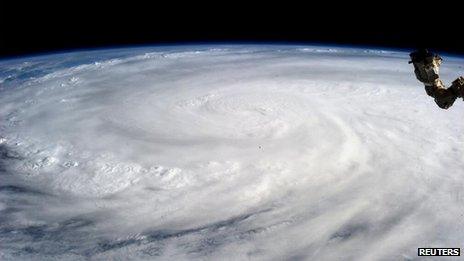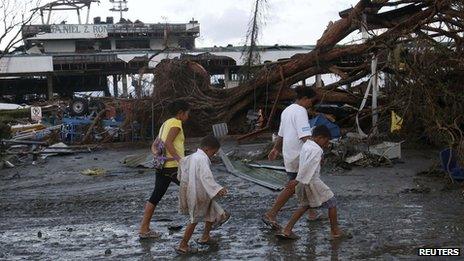Typhoon Haiyan: UK commits aid for 500,000 in Philippines
- Published
Rupert Wingfield-Hayes reports from the airport at Tacloban: ''A scene of complete devastation''
Britain has committed £6m to help up to 500,000 people affected by the typhoon that swept through the Philippines.
The Department for International Development (DfID) said the money would be given to pre-approved organisations to provide "crucial humanitarian aid".
Up to 10,000 people may have died, while hundreds of thousands have been displaced by Typhoon Haiyan.
David Cameron called President Aquino to express support, as the UK sent humanitarian specialists in to assist.
The four experts will join three advisers already in the country to help co-ordinate the international response to the typhoon, which is one of the most powerful storms to ever hit land.
Shelter a 'priority'
International Development minister Alan Duncan told the BBC the aid figure would be kept under "constant review".
"We are doing our best. It is going to need a lot more than us. The whole world community is going to have to work together," he said.
Alan Duncan: "It's all hands on deck for what is turning out to be a massive catastrophe"
The prime minister spoke to President Benigno Aquino on Sunday to express his condolences, and said the UK government was looking at ways to assist the relief effort.
International Development Secretary Justine Greening said urgent aid would be provided, including temporary shelter and access to clean water.
She said: "UK support is now under way. Many thousands of people in remote, hard-to-reach communities have lost their homes and everything they own. They are living in the open and are completely exposed to the elements.
"The absolute priority must be to reach them with shelter and protection as soon as possible."
In addition to the £6m pledged, supplies from UK aid warehouses and air transportation total a further £600,000.
Evacuation in Vietnam
The typhoon has created scenes of devastation and the country's president said he feared there would be "substantially more casualties".
The Philippine government has so far only confirmed the death of several hundred people after the storm struck.
But regional police chief Elmer Soria said he was told by the provincial governor of Leyte that there were about 10,000 deaths on the eastern island alone.
Darren White, a British tourist who experienced the typhoon in Cebu province in the Philippines, said the situation for survivors was deteriorating, largely due to a lack of access to food and clean water.
"There was rotting vegetation on the streets, stagnant water, flies were starting to come so disease would have been coming up as well," he said.

Haiyan is thought to be one of the most powerful typhoons to hit landfall
The storm made landfall shortly before dawn on Friday, bringing gusts that reached 379km/h (235 mph), according to the US Navy's Joint Typhoon Warning Center, with waves as high as 15m (45ft), bringing up to 400mm (15.75 inches) of rain in places.
With the typhoon now bearing down on Vietnam, another team of UK experts has also been put on standby to travel there.
More than 100,000 Britons visit Vietnam every year, with many visiting the northern city of Hanoi, the capital, and the popular tourist destination of Halong Bay in the north east of Vietnam, both of which are expected to be in the path of the typhoon.
Tourist David Riley said: "I am quite frightened because we don't have anything like this in England.
"We've spoken to a few locals and they've calmed us down a little bit and said we'll be alright as long as we stay indoors."
David Riley, who is also in Vietnam, said: "All we are going to be doing is to get in the hotel, just making sure we stay in there, get a lot of food and water just in case it does hit badly.

The UK said its support would provide clean water, shelter and blankets
"But hopefully, all being well, it won't hit as badly as it has in the Philippines."
The Foreign Office is advising travellers to follow advice from local authorities and has teams on standby in Hue and Da Nang to assist any British nationals.
Current projections suggest it could move northwards along the coast from Sunday afternoon local time before making landfall south of Hanoi - although it is expected to decrease in power as it reaches land.
Authorities there have begun the mass evacuation of more than 200,000 people.
- Published10 November 2013
- Published9 November 2013
- Published8 November 2013